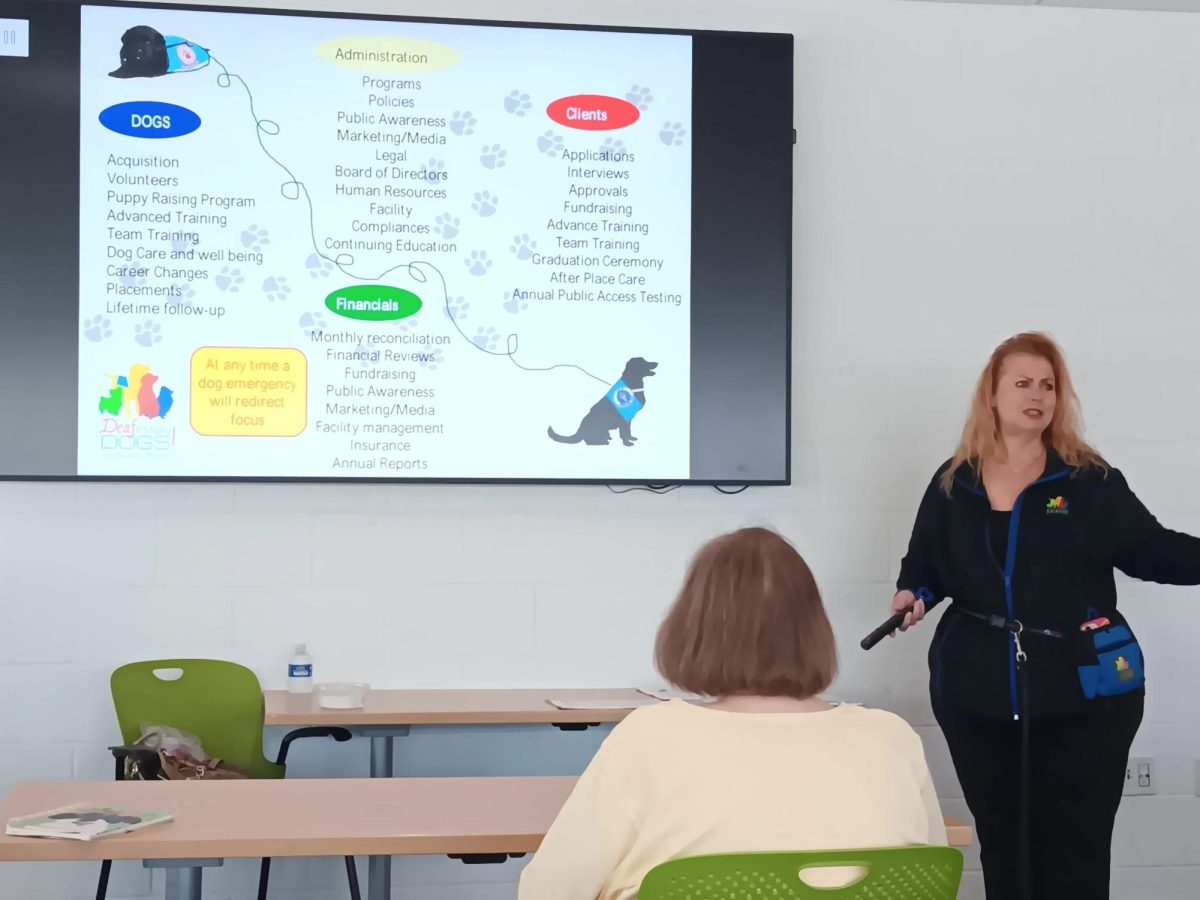Sherry Ross, co-founder of Deafinitely Dogs was the speaker at Lester Buresh Family Community Wellness Center’s adult speaker series, which is returning this fall. Check the LBC website for a full slate of upcoming speakers in the series.
Ross explained the importance of service animals and the differences between classes of trainings animals received.
“At Deafinitely Dogs, our dogs matter,” Ross said. “They are just as important to us as the people we serve, and our goal is they get to live a happy, healthy life doing the tasks they love.”
Ross said one area that differentiates them from other training animals – They believe in only positive reinforcement training.
“We want to teach smart, thinking dogs, who are better at navigating life at all times,” Ross said.
Each dog, even from the same litter of puppies, has their own personality and interests.
At Deafinitely Dogs, the dogs are supported their whole life. Most dogs are partnered with their person for their life.
As the company is nearing 10 years in existence, Ross said that one concern is some of their service dogs are nearing retirement age for their particular owner. In those cases, the goal is to have a dog training to replace the dog currently in the owner’s life that meets the owners needs, while allowing the current dog to step down in responsibilities as they near the end of their working life. Deafinitely Dogs is one of 23 organizations nationwide that was selected to help with training dogs for military health care in Bethesda, Md., about the minimal training amounts of service dogs needed.
Service dogs are animals who are trained to be near a human at all times when they are in public. They function much like a walker or wheelchair, and are allowed anywhere a human has to have tasks to complete. They are allowed in stores, movies and restaurants. The animal is specifically trained for an individual to aid in several tasks, depending on the care the person needs.
“One distinction for service dogs is it is very rare they are trained to deal with multiple people,” Ross said.
“When they have their cape on, they are a working dog and know they have jobs to do.”
Owners are trained how to speak up on behalf of the dog to stop people from petting or interacting with said animal if that is not wanted.
Facility dogs are animals who work in a designated facility, usually around children or patients in an 8 a.m. to 5 p.m. setting. They are more available to interact with multiple people in a day, but are still a very task- oriented dog.
Therapy dogs, much like facility dogs, are there to work in areas like libraries, schools and hospitals and provide comfort and emotional support to people as needed.
Ross said that many of these animals are good at emotional support. The category that causes a lot of issues are emotionalsupport animals.
“Emotional support animals can be absolutely anything,” Ross said. “They have almost no training at all,but they provide emotional support for someone with a psychological disability. Those owners think because they have an emotional support animal, it has the access rights trained service animals have. They do not have those rights.”
The only animals recognized as service animals are dogs and miniature horses. Deafinitely Dogs have animals that work in schools, funeral homes, senior living centers, mental health counselors as well as private individuals.
One of the biggest success stories for Deafinitely Dogs was their service dog who worked at a care facility during COVID. When those nursing homes were locked down, because that dog has already been licensed and working in the facility, they were allowed in every day.
Ross said that was what helped many of those residents through that time was interacting with that dog throughout lockdowns.
A lot of their service animals are helping soldiers coping with ailments like post traumatic stress disorder. As part of their visits, they learn what type of care a person needs and how an animal can help them.
She shared the story of Axel, a soldier who returned to Cedar Rapids and had PTSD. Axel had originally been looking for an animal to help with his disabled son, but as the crew at Deafinitely Dogs was visiting, they discovered how bad his PTSD was becoming and how isolating it was for Axel.
“He went from living and being happy to going out in his 20s before the service, to when he came back only be willing to go to his job during the day, but not wanting to do that when he came home at night,” Ross said. “He was having nightmares and flashbacks to his service, and his violent nightmares would push him to sleep on the couch or after an instance where he startled his son, sleep in the basement to protect them.”
After Axel met Tucker, that changed. That dog has been able to help disrupt his nightmares. Because of that service animal, Axel is able to go out to events and hang out with people and friends with Tucker by his side.
Ross said that explains the impact of a service animal goes beyond one person and a dog. Those interactions allow them to do so much more.
At this point, one of the greatest needs for Deafinitely Dogs is people willing to be Puppy Raisers. They are raising socialized puppies who will eventually be trained as a service animal. Puppy raisers can foster a puppy from anywhere from six months to the full two years of training. Those raising the puppies need to be at classes with the dogs every Tuesday evening where they will work on age appropriate skills to be trained with the puppy. They also need to be willing to take the puppies out and exposed to different environments as part of the training.
Their next biggest need is financial support, followed by advocacy to let people know they exist. Volunteers are also welcome.
The average cost for Deafinitely Dogs to train a dog from puppy to active service is roughly $28,000. Ross said they run leaner than some other agencies, where the national amount ranges between $35,000 and $50,000. The cost of dog food and veterinary care has been rising in recent years.
Deafinitely Dogs has a graduation rate of 67 percent, compared to the national rate of 40 percent. The COVID-19 pandemic did impact some of their graduation rate, as some dogs found they just wanted to be pets as opposed to service animals.
Deafinitely Dogs has a 100 percent team retention rate.
For more information on Deafinitely Dogs, check out deafinitelydogs.org.
What should you do when you see a service dog in person?
• Do not distract the dog by making dog noises or noises
at the animal.
• Talk to the handler of the animal, not to the dog, unless
you are given permission from the handler.
• You can ask the handler about their dog, but do not ask
about the handler’s disability.
• You can ask to pet the dog – but do not expect to always
be able to pet the animal. That animal is a working dog,
and their handler knows what interactions work best for
the animal.

